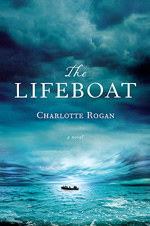
Grace Winter, the narrator of Charlotte Rogan's The Lifeboat, is as unreliable as narrators come. Twenty-two years old, a newlywed and a widow, Grace is standing trial for her life. The Lifeboat is her attempt to recreate a tragic twenty-one days of her life, in hopes that her lawyers can use the document to inform their defense. Grace admits these facts in the opening chapter as a warning to readers: do not trust what is written here.
Following an explosion onboard the Empress Alexandra, Grace and thirty-eight other passengers are stranded in a lifeboat in the middle of the Atlantic Ocean. Their hopes are high; since the sinking of the Titanic only two years before, lifeboat regulations are stricter and sailing lines have shifted south to warmer waters. Help is surely on its way. However, things quickly deteriorate. The lifeboat meant for forty adults is actually suited for fewer, and constant baling is necessary. A man attempting to join the lifeboat is kicked in the face, and a small child is left floating on a piece of wood. Two barrels of water are hoisted aboard, but their contents are closely guarded by Mr. Hardie, an Empress Alexander employee who assumes control of the survivors. Onboard are mostly women, including Mrs. Grant, a formidable character who manipulates the other passengers. With the help of Hannah West, Mrs. Grant appeals to the emotions and morals of the women, alienating Mr. Hardie and the men.
Despite knowing that Grace is shaping her narrative to prove her innocence, the reader cannot help but trust her. She relates her thought-processes carefully, admitting to minor immoral thoughts but always choosing the moral action. Grace's flaws make her sympathetic, and her honesty regarding her feelings dupes the reader into believing her every word.
A sense of claustrophobia pervades the pages of The Lifeboat, coming from both the confined setting of the boat and the walls of Grace's mind. Rogan describes the power of the sea, molding it into a character as manipulative as Mrs. Grant. Storms threaten to tip the passengers, and there is an always-present sense that death is imminent. In a sub-plot, Grace explains how she seduced her husband away from another woman, and her fear of being shunned by her upper-class in-laws adds another layer to the captivity that characterizes Grace's life.
The Lifeboat is an extraordinary novel. Grace's attempt to sway her jury, and also
the reader, is fascinating to experience. The fate of the passengers on the lifeboat may
be obvious from page one, but that never detracts from the urgency of their plight. As
The Lifeboat storms toward an inevitable act of violence, the reader is swept away
by waves of manipulation, grasping for a breath of the truth.

Virago (UK), hardcover, 9781844087525
Reagan Arthur Books (US), hardcover, 9780316185905
